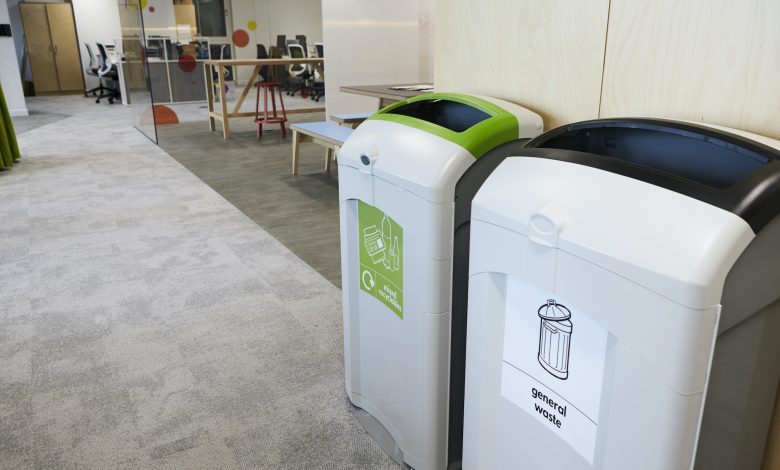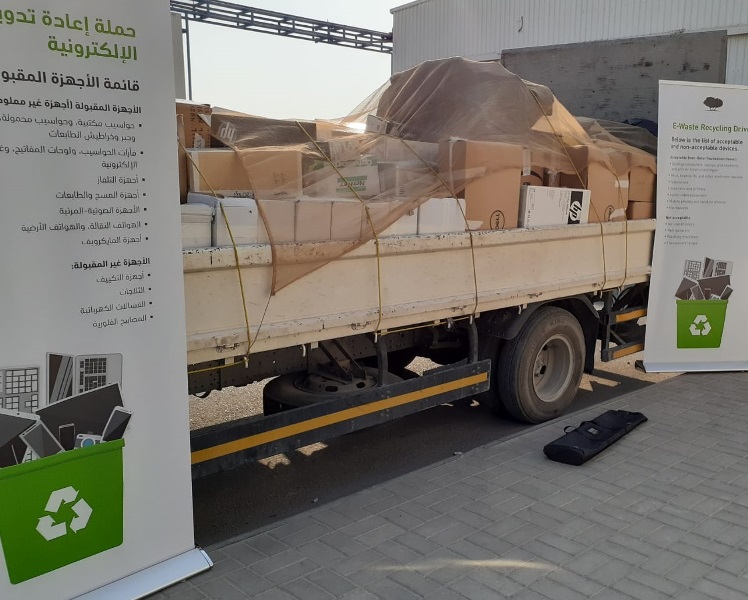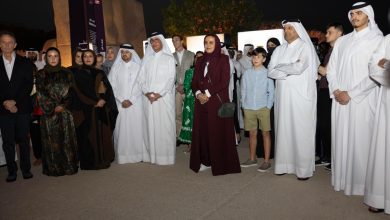
Qatar Foundation takes action against e-waste
مؤسسة قطر تتخذ إجراءات ضد النفايات الإلكترونية
The Peninsula
E-waste collection bins placed across Education City
Doha: Qatar Foundation is encouraging members of the community to celebrate Qatar Sustainability Week by recycling their e-waste, dropping off old and used electronics at designated collection points in Education City.
The bins, located in Multaqa (Education City Student Center), the Penrose House (LAS Building), and Lulu Express at housing lot 4, are part of Qatar Foundation’s (QF) e-waste drive, which – launched in October and set to run until the end of December – is being held in collaboration with Al Haya Waste Management & Projects Company.
Items that can be deposited include desktop computers, laptops, monitors, printer and copier toners, cartridges, keyboards, televisions, scanners, audio-video equipment, mobiles, telephones, and microwaves.
However, air conditioners, refrigerators, washing machines, and florescent lamps will not be accepted.
This year marks the second annual e-waste drive at QF. Aisha Ghani, Environment Specialist, Health, Safety, Security & Environment Directorate, QF, said: “Last year, the campaign lasted seven days. This year, we are delighted to have extended it to three months.

“We decided to lengthen the campaign because of the overwhelmingly positive response we received last year, with more than 4.5 tons of e-waste collected in just seven days. Ultimately, we aim to make these bins semi-permanent features.”
Once the electronics are collected, categorized, and packed at the Al Haya facility, they are then shipped to a special recycling factory in Singapore.
Once received by the recycling center – Cimelia – they are broken down and separated, into materials such as plastic, copper, and aluminum, sent to other factories and made into new products.
“E-waste is a growing global problem, and 2019 set a record for the most amount of e-waste generated worldwide. This is a huge concern, as electronics can contain hazardous materials, and – if not discarded correctly – can contaminate water sources and damage the environment,” Ghani said.
“This is a nationwide recycling drive. We are trying to lead by example and encourage the nation to take a stand. And it is especially timely this week with Qatar Sustainability Week taking place.”
“We decided to lengthen the campaign because of the overwhelmingly positive response we received last year, with more than 4.5 tons of e-waste collected in just seven days. Ultimately, we aim to make these bins semi-permanent features.”
Once the electronics are collected, categorized, and packed at the Al Haya facility, they are then shipped to a special recycling factory in Singapore.
Once received by the recycling center – Cimelia – they are broken down and separated, into materials such as plastic, copper, and aluminum, sent to other factories and made into new products.
“E-waste is a growing global problem, and 2019 set a record for the most amount of e-waste generated worldwide. This is a huge concern, as electronics can contain hazardous materials, and – if not discarded correctly – can contaminate water sources and damage the environment,” Ghani said.
“This is a nationwide recycling drive. We are trying to lead by example and encourage the nation to take a stand. And it is especially timely this week with Qatar Sustainability Week taking place.”
“We decided to lengthen the campaign because of the overwhelmingly positive response we received last year, with more than 4.5 tons of e-waste collected in just seven days. Ultimately, we aim to make these bins semi-permanent features.”
Once the electronics are collected, categorized, and packed at the Al Haya facility, they are then shipped to a special recycling factory in Singapore.
Once received by the recycling center – Cimelia – they are broken down and separated, into materials such as plastic, copper, and aluminum, sent to other factories and made into new products.
“E-waste is a growing global problem, and 2019 set a record for the most amount of e-waste generated worldwide. This is a huge concern, as electronics can contain hazardous materials, and – if not discarded correctly – can contaminate water sources and damage the environment,” Ghani said.
“This is a nationwide recycling drive. We are trying to lead by example and encourage the nation to take a stand. And it is especially timely this week with Qatar Sustainability Week taking place.”
Source: thepeninsulaqatar
الشرق
الدوحة: احتفالا بحلول أسبوع قطر للاستدامة، تُشجع مؤسسة قطر أفراد المجتمع على إعادة تدوير النفايات الإلكترونية والتخلص من أجهزتهم القديمة والمستعملة، عبر تخصيص ثلاثة مواقع للنفايات الإلكترونية في المدينة التعليمية.
تتوزع المواقع بين ملتقى (مركز طلاب المدينة التعليمية)، وبنروزهاوس (مبنى الآداب والعلوم)، ومركز اللولو للتسوق في المجمع السكني رقم 4، وتعد السلال التي وضعت خصيصًا لجمع النفايات الإلكترونية، جزءًا من حملة مؤسسة قطر الرامية إلى الحدّ من النفايات الإلكترونية والتي تم تدشينها في أكتوبر، وستستمر حتى نهاية ديسمبر المقبل بالتعاون مع شركة الحياة لإدارة النفايات والمشاريع ذ.م.م.

تشمل الأجهزة التي يمكن إيداعها أجهزة الكمبيوتر المكتبية، والمحمولة، الشاشات، الطابعات، خراطيش الطباعة، أدوات الأحبار، لوحات المفاتيح، أجهزة التلفاز، النواسخ الضوئية، أجهزة الصوت والفيديو، الهواتف المحمولة، الهواتف الأرضية، أجهزة الميكروويف. لكنها لا تشمل الأجهزة التالية: مكيفات الهواء، الثلاجات الغسالات، ومصابيح الفلوري.
وبمناسبة مرور سنتين على حملة الحد من النفايات الإلكترونية، قالت عائشة غني، أخصائية البيئة في إدارة الصحة والسلامة والأمن والبيئة في مؤسسة قطر: “في العام السابق، استمرت الحملة سبعة أيام، وهذا العام، يسرنا تمديد الفترة إلى ثلاثة أشهر بسبب ردود الفعل الإيجابية الهائلة التي وصلتنا في العام السابق، فقد جمعنا أكثر من 4.5 طن من النفايات الإلكترونية خلال سبعة أيام فقط، كما نسعى في النهاية إلى تكريس هذه السلال بشكل شبه دائم في المستقبل”.
بعد جمع النفايات الإلكترونية وتصنيفها وتغليفها في مبنى شركة الحياة، يتم شحنها إلى مصنع خاص للتدوير في سنغافورة. وعند استلامها في مركز التدوير المعروف بـ(سيميليا)، يتم تفكيك النفايات وفصلها بناءً على نوع المادة الخام المستخدمة في التصنيع كالبلاستيك، النحاس، والألمنيوم، ثم إرسالها إلى مصانع أخرى وتحويلها إلى منتجات جديدة.
أضافت عائشة قائلة: “تعد مشكلة النفايات الإلكترونية عالمية، فبحلول عام 2019 تم تسجيل رقم قياسي لكمية النفايات المُنتجة عالميًا، وهو أمر مقلق للغاية، فقد تحتوي الأجهزة الإلكترونية على مواد خطرة من شأنها تلويث مصادر المياه وإلحاق الضرر بالبيئة إن لم يتم التخلص منها بشكل صحيح”.
وختمت: “نتطلع إلى امتداد هذه الحملة لتشمل شتّى أنحاء البلاد، ونسعى جاهدين لنكون قدوة يحتذى بها في هذا الإطار، كما أننا ندعو أفراد المجتمع ونشجعهم على اتخاذ المبادرة والموقف اللازم للحد من هذه النفايات، وما من وقت أمثل لتحقيق ذلك أكثر من أسبوع قطر للاستدامة.”
المصدر: al-sharq



